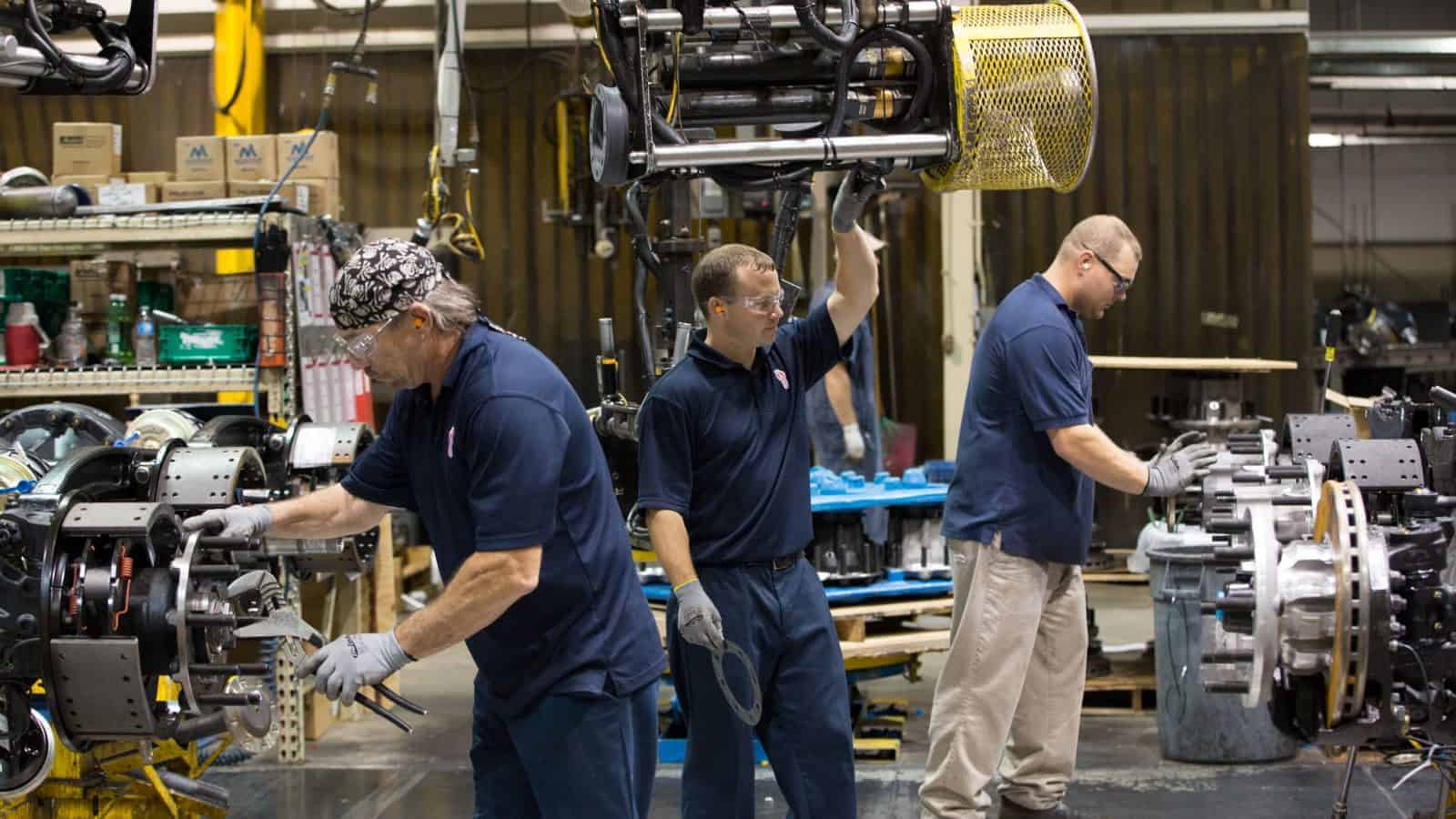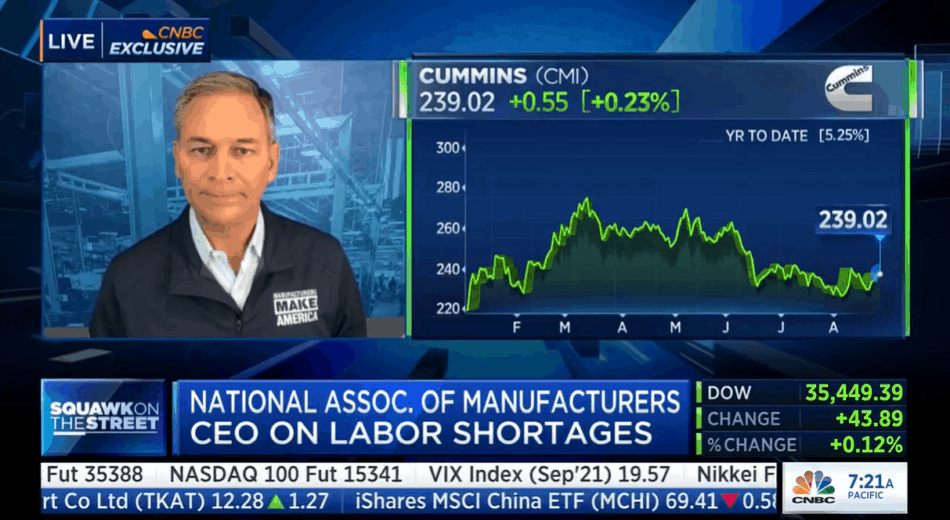Still Leading the Way: Manufacturers Make Creators Wanted Live Possible
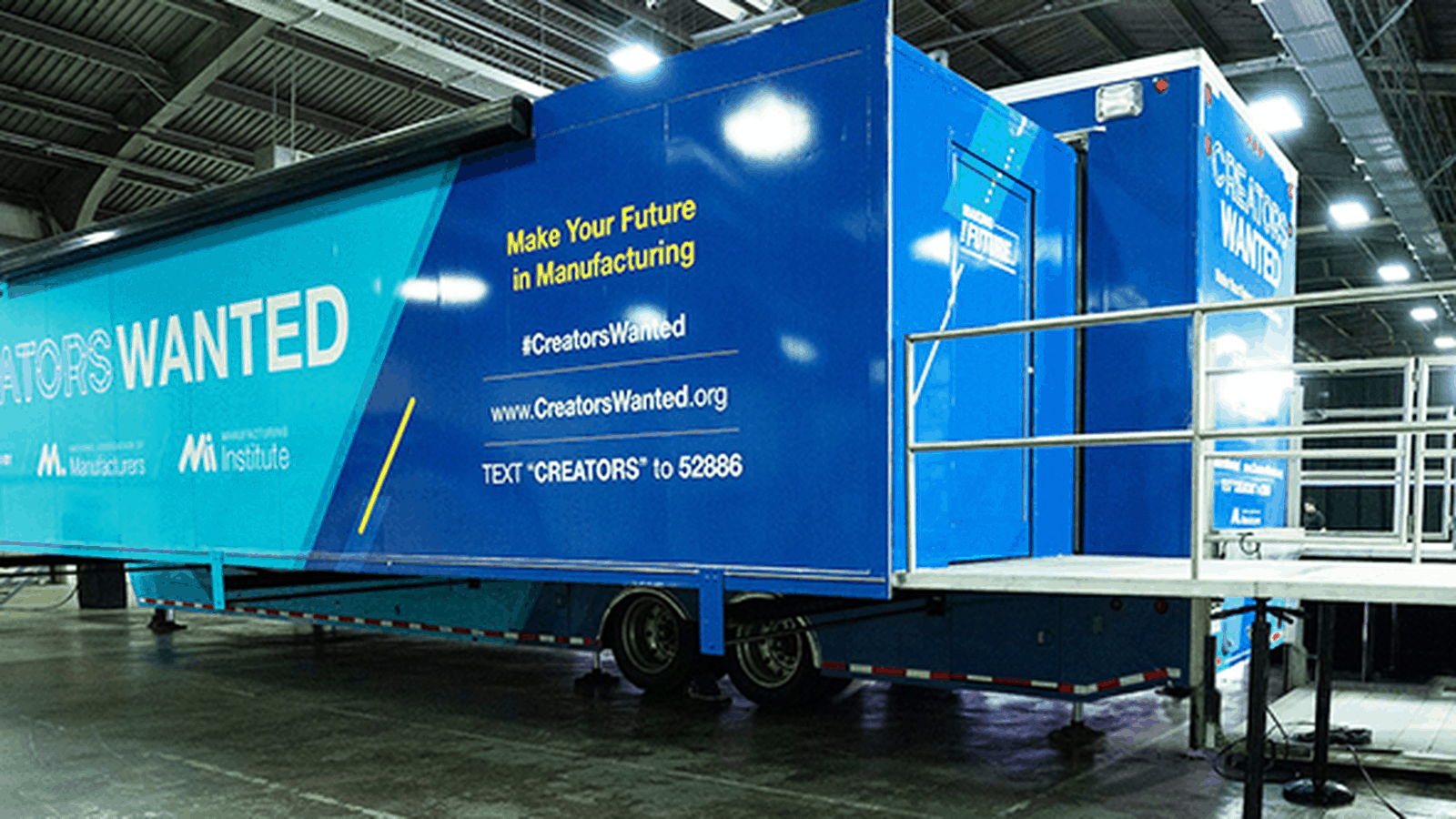
Through a global pandemic, manufacturers have led the way on health and safety measures, helping keep Americans working—for the U.S. and the world. Now the manufacturing industry continues that leadership while recruiting and inspiring the creators of the future.
On the road: Creators Wanted, the workforce campaign of the NAM and the MI, is getting ready to hit the road. The campaign formalized its COVID-19 safety protocols and is employing state-of-the-art technologies, like Sphere Synexis, provided by legacy sponsor Trane Technologies, to continuously fight viruses, bacteria and other hazards in the air and on surfaces. The mobile experience, along with other programming events and new online resources, will bring the story of modern manufacturing to communities across the country.
- The experience, recently endorsed by The Dallas Morning News, is designed to capture the imaginations of students, teachers and parents and inspire the next generation of manufacturers.
- It will complement the upcoming release of the NAM and MI’s innovative online resources for those seeking a career in manufacturing.
Coming to a town near you: The NAM and MI released the following Creators Wanted Live tour dates and stops.
- Oct. 4–7: Columbus, Ohio
- Oct. 12–15: Charlotte, North Carolina
- Oct. 20–22: West Columbia, South Carolina
- Nov. 8–10: Pella, Iowa
- Nov. 16–18: Freeport, Texas
- Nov. 30 – Dec. 3: Dallas, Texas
Wait, there’s more! Community programming stops are also coming to Detroit, Michigan; Guthrie, Kentucky; Pittsburgh, Pennsylvania; and Carson City, Nevada. And a new suite of digital and online experiences and tools will bring the campaign to every state.
Thanks to strong support: “Our ability to mount this bold solution to the workforce crisis through the difficulties of a pandemic has been anything but certain,” NAM President and CEO Jay Timmons and NAM Board Chair Mike Lamach said in a joint message to NAM membership. “It has taken the unwavering and strong support of some of America’s leading enterprises and business leaders to keep this campaign alive.”
See the full list of Creators Wanted sponsors here. Want to support the effort? Get involved—at any price point—here.
From a Small Farm to a Global Manufacturing Company: A STEP Honoree Story

Neha Phadke is a long way from home. Originally from a small farming village in India, Phadke grew sugar cane, onions, wheat and watermelon to support her seven-person family while she completed her bachelor’s degree. She moved to the United States to earn her Ph.D. in organic chemistry when Texas Tech University offered her full funding.
Today, Phadke works as a senior process chemist at Covestro, a high-tech polymer materials manufacturer that makes products used in industries including automotive, construction, health care, cosmetics, energy, electronics and sports. It’s her responsibility to find ways to improve production while maintaining quality.
Focused on manufacturing: Even when she was studying organic chemistry as an undergraduate and grad student, Phadke knew that she was more interested in applied science than academia. Near the end of her Ph.D. program in 2015, she received an internship opportunity at Covestro, which was then called Bayer Material Science. That internship turned into a job offer, and she has been working at Covestro ever since.
- “I was asked if I wanted to go into research and academia or manufacturing, and I was 100% sure I wanted to go into manufacturing,” said Phadke. “I had a feeling that this was where I belonged.”
Everything’s bigger in Texas: Still, Phadke faced a learning curve when she shifted from academia to manufacturing, including the scale of the work she was doing.
- “I had never seen big plants and reactors,” said Phadke. “I had worked on my Ph.D. in milligrams, and here I’m making more than 30,000 pounds of material in the reactors. It was fascinating, and I enjoyed the experience, process and learning through the new challenges.”
Standing up: Phadke may work in an environment that’s traditionally been male dominated, but she has never let that stop her before. Even when she was growing up, she knew that her ability to succeed should have nothing to do with her gender.
- “I was always asked if I had a sibling, and I would say I have a younger sister—and I would get sympathy for not having a brother,” said Phadke. “As a kid, I wouldn’t understand why it should make any difference. And it pushed me to think: why can’t I do anything a guy can do?”
Serving as an example: The Manufacturing Institute recently selected Phadke as a 2021 STEP Ahead Award Honoree—an honor given to women leaders who have excelled both within their companies and in the industry as a whole. She encourages other women to get involved in manufacturing and says that, while the industry might seem daunting, she’s gotten plenty of support from her colleagues and her company.
The last word: “Anything is possible,” said Phadke. “Don’t let anyone stop you from doing what you believe is right. Wear your courage, face your fears, lead your path, follow your passion and inspire others.”
Learn more about the STEP Ahead program, including how to honor remarkable women on your team, here.
How IPAK’s Diversity Sustained It Through COVID-19
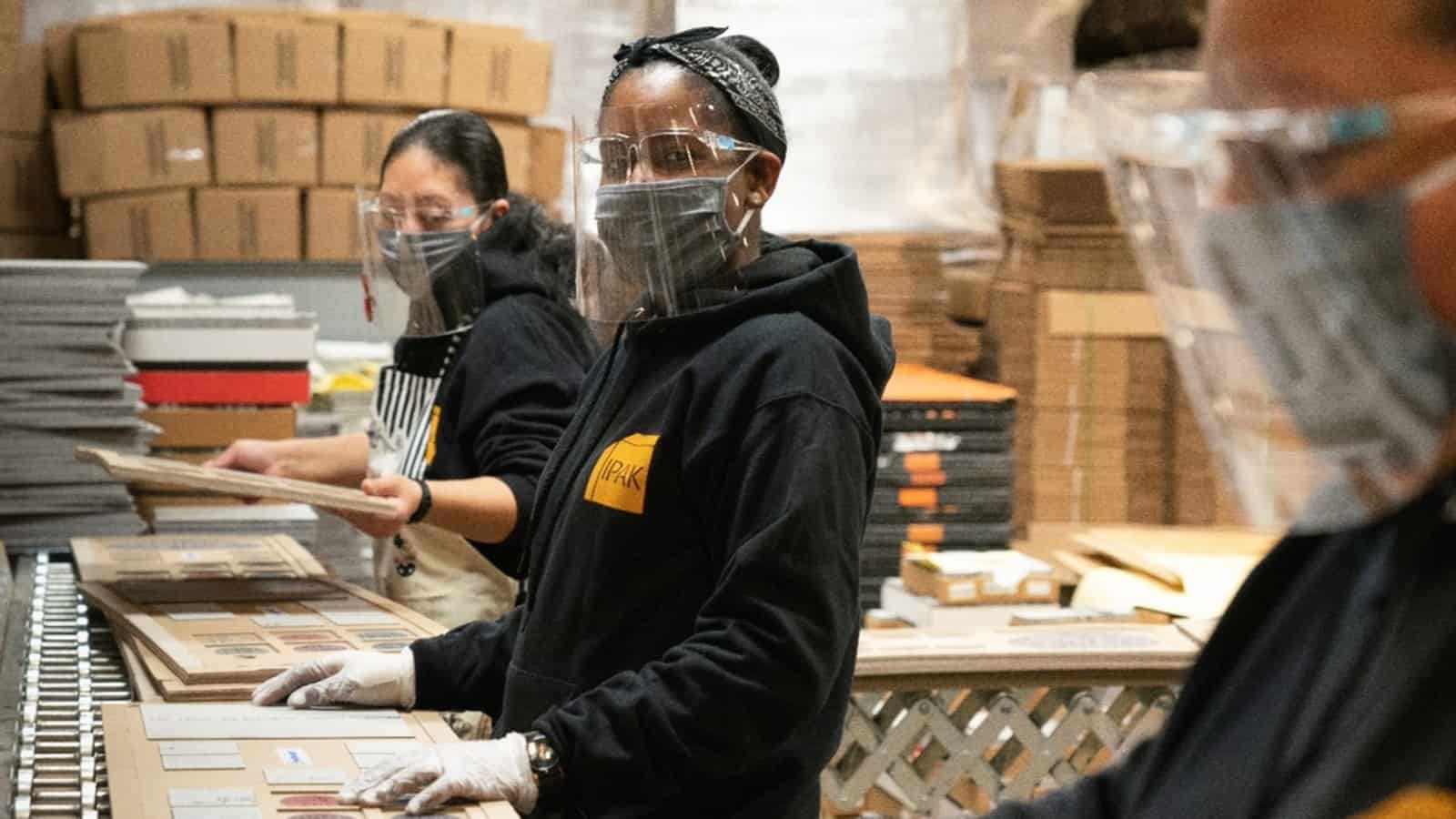
When COVID-19 swept through Camden, New Jersey, it hit the kit and packaging manufacturer IPAK very hard. The majority of IPAK’s nearly 100 employees are women and people from underserved communities, and like many other similarly situated groups, they suffered from particularly high case rates and economic disruption. But it was the company’s long commitment to diversity, equity and inclusion that helped it get through this global disaster—and even allowed it to thrive.
We spoke to IPAK CEO Karen Primak about all the company did to safeguard its employees and serve its customers. Here’s what she told us.
Keeping employees safe: The early days of the pandemic were terrible; the company had four employees in the hospital on respirators “right from the beginning,” says Primak. But IPAK responded swiftly and comprehensively:
- IPAK created an extensive COVID-19 action plan to prepare, inform and assist employees. This included an “ambassador” program so team members had a point of contact to ask about their virus-related concerns and receive answers and resources in the five different languages that employees speak.
- The company rearranged schedules to allow workers without childcare to be home when needed. Managers spent an hour or two every morning discussing how they could accommodate everyone.
- IPAK stayed current with the latest science and data, so that it could react quickly to the fast-changing pandemic. The company instituted an evolving set of daily cleaning protocols, social distancing measures, remote work provisions, masking and face shield requirements, vaccine information sessions and regular COVID-19 testing.
All these measures allowed IPAK to remain open and continue to deliver high-quality solutions to its customers throughout the pandemic. And here’s one last impressive detail: “We didn’t furlough or lay off anyone,” said Primak. “Despite all the craziness and the disproportionate impact on our employees and revenue, we remained committed to employing our workforce during this awful time.”
The “secret weapon”: How did IPAK cultivate the flexibility and dedication necessary to get through a global pandemic?
- “Diversity, equity and inclusion have been our secret weapon,” Primak said. “If you hire people like you, all you get back is you. IPAK is equipped with a range of voices and perspectives, which helps us innovate and creatively solve problems. Our commitment to put employees first and understand their needs allowed us to come together and stay operational during such a difficult time.”
Success during upheaval: IPAK also went above and beyond for its clients, including nonprofit educational-content provider ACT, maker of the well-known college-entrance exam, whose supply chain was upended by COVID-19.
- ACT was faced with shipping disruptions, shuttered test centers, constantly changing local conditions and testing center capacity constraints. It needed an agile partner who would be able to move quickly, adjust schedules and innovate in real time.
- As a result, ACT pivoted early in the pandemic and massively expanded its contract with IPAK to include the handling of secure paper-based processing, which includes creating kits and manufacturing and distributing the ACT test.
- Amid all this disruption and change, IPAK stepped up. Its staff worked tirelessly with ACT to deliver more than 2 million college-entrance exams during the pandemic.
“We worked nights and weekends and even hand-delivered some test booklets to make sure they arrived on time,” said Primak.
A great partnership: “We were the vendor that was willing to make huge and necessary changes alongside ACT during the pandemic so that many deserving students could take the ACT and benefit from the opportunities afforded by their hard work,” Primak said.
- “IPAK asked so many questions about our organization and offered a unique process optimization perspective,” said ACT CEO Janet Godwin. “It was clear they had deep knowledge of the education marketplace and cared about our mission—not just their bottom line. IPAK knocked its first assignment out of the park, catalyzing ACT to outsource additional critical programs to IPAK.”
NAM involvement: Primak also credits the NAM’s work with Congress and the administration with helping IPAK survive and succeed. She is grateful for government programs such as the employee retention tax credits, economic injury disaster loans and Paycheck Protection Program loans, which the NAM advocated for, and said that without such help, the company “wouldn’t be here.”
The last word: “Helping people achieve success and ensure equity, access and opportunity for all” is ACT’s mission, said Primak. It’s that type of commitment to equity and inclusion that also motivates IPAK’s whole team, in good times and in pandemics.
The NAM and The Manufacturing Institute are committed to increasing diversity and inclusion in the manufacturing industry. Visit the NAM Pledge for Action page to make your own commitment today.
Manufacturers Share Commitment to Vaccination
Requirements Must Be Structured in a Way That Does Not Negatively Impact the Operations of Manufacturers
Washington, D.C. – Following President Biden’s speech on new measures to combat COVID-19, National Association of Manufacturers President and CEO Jay Timmons released this statement:
“Americans can be grateful to President Trump for ‘Operation Warp Speed’ that enabled the United States to develop the lifesaving vaccines against COVID-19 and to President Biden for his continued focus on getting Americans vaccinated. We share their steadfast focus, and manufacturers have led the way in promoting the lifesaving COVID-19 vaccines. They are safe and effective vaccines made for us, by people like us—manufacturers in America.
“We look forward to working with the administration to ensure any vaccine requirements are structured in a way that does not negatively impact the operations of manufacturers that have been leading through the pandemic to keep Americans safe. It is important that undue compliance costs do not burden manufacturers, large and small alike.
“Getting all eligible Americans vaccinated will, first and foremost, reduce hospitalizations and save lives. But it is also an economic imperative in that our recovery and quality of life depend on our ability to end this pandemic. This is why the NAM and The Manufacturing Institute continue equipping manufacturers of all sizes with resources to promote vaccination through our ‘This Is Our Shot’ project.”
-NAM-
The National Association of Manufacturers is the largest manufacturing association in the United States, representing small and large manufacturers in every industrial sector and in all 50 states. Manufacturing employs more than 12.3 million men and women, contributes $2.35 trillion to the U.S. economy annually and has the largest economic multiplier of any major sector and accounts for 58% of private-sector research and development. The NAM is the powerful voice of the manufacturing community and the leading advocate for a policy agenda that helps manufacturers compete in the global economy and create jobs across the United States. For more information about the NAM or to follow us on Twitter and Facebook, please visit www.nam.org
Manufacturers’ Job Training Gets a Federal Boost
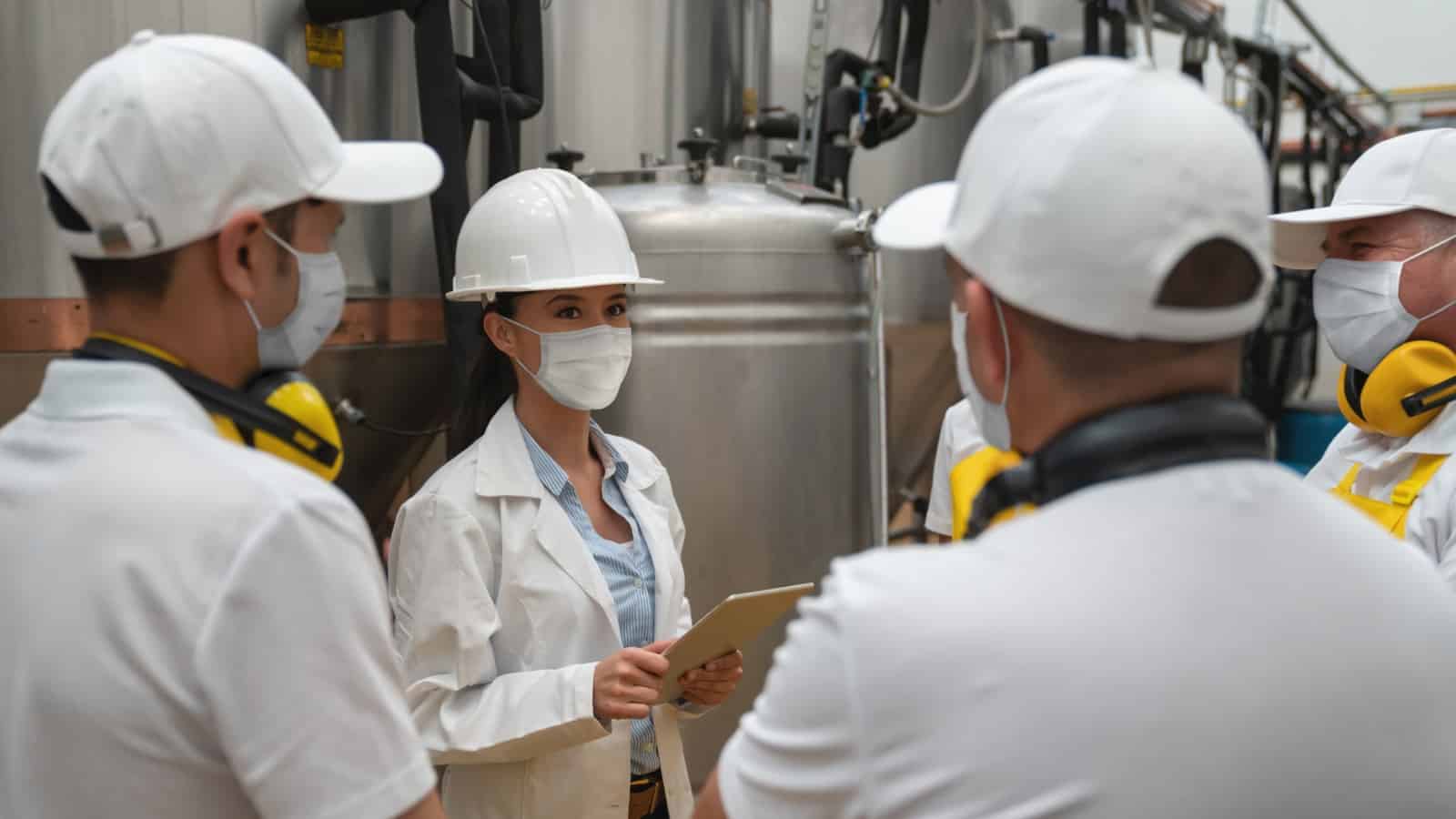
The Economic Development Administration has $3 billion to spend on job training—and manufacturers should start preparing now to attract some of that funding to their regions.
What’s happening: The American Rescue Plan Act, signed into law by President Biden in March, set aside $3 billion for a historic investment by the EDA in bottom-up economic development, according to a recent information session hosted by The Manufacturing Institute, the workforce development and education partner of the NAM.
- Part of that money includes $500 million for the EDA’s Good Jobs Challenge, which helps fund job-training programs from design and development through implementation.
Applicants wanted: Applications for the funding—which can be spent by eligible recipients on a wide variety of expenses, including curriculum development, equipment purchases and training-facility leases—are due Jan. 26, 2022. (Read the Notice of Funding Opportunity here.)
“One of the key things we’re looking for in these proposals is a commitment to hire,” said EDA Deputy Assistant Secretary for Policy Michele Chang. “We are in a time where we want to get folks back into jobs quickly.”
Who’s eligible? While nearly all types of public and private nonprofit groups are eligible, the EDA is seeking organizations that have strong credibility with employers and a proven track record of success.
- How manufacturers can help: Raise this grant opportunity with your trusted economic development or workforce partner and encourage them to contact the MI at [email protected] to learn more.
- A good fit: The EDA program is a natural fit for the MI’s efforts, according to MI Vice President of Strategic Initiatives Gardner Carrick. As he put it, “We are all working to attract more individuals to manufacturing.”
Boot Camp: Those who want to put their best foot forward during the EDA application process should consider the MI Boot Camp. These eight coaching sessions, which will run from mid-September to mid-December, will include workshops, discussions and expert mentorship designed to help applicants compete for the funds.
- The MI Boot Camp is provided free of charge, but attendees will be selected via an application process. Email [email protected] for more information and how to apply.
Why it matters: Manufacturers are dealing with a worrying lack of skilled workers. As of July, the industry had a total of 889,000 job openings, according to the Bureau of Labor Statistics. This vacuum could grow to 2.1 million unfilled jobs by 2030, according to a recent study by Deloitte and the MI—an excellent reason to expand training programs as fast as possible.
The last word: The MI encourages all those who meet eligibility requirements to apply for funds to support their job-training programs. Said Carrick: “The EDA has to be commended for what is really a very impressive grant program.”
Interested in more of the NAM and MI’s work to attract workers to the manufacturing industry? Check out our Creators Wanted campaign.
NAM Launches Manufacturers United
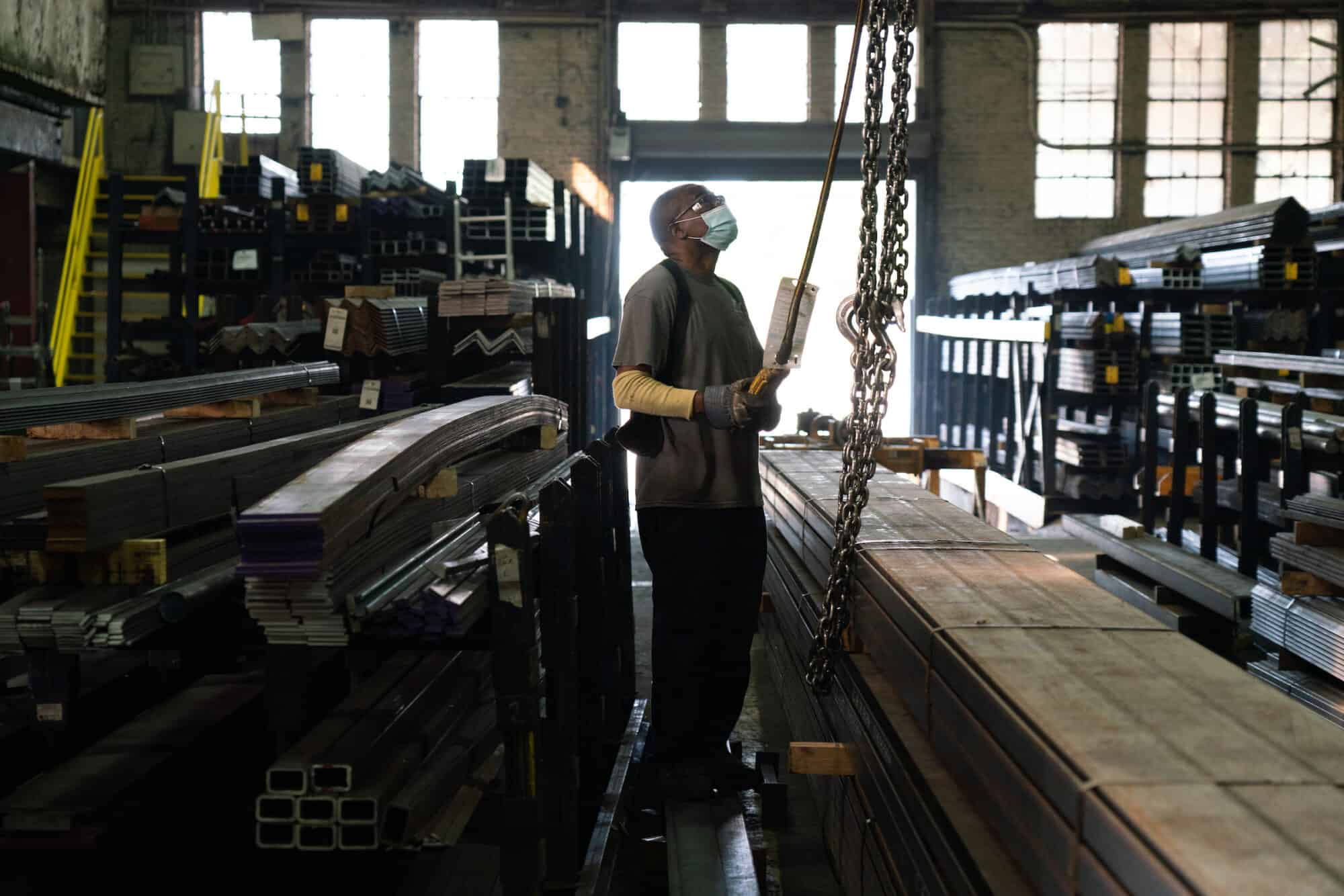
With major policy issues coming to a head this fall in Washington, the National Association of Manufacturers this week launched Manufacturers United – a new digital platform to power the industry’s grassroots advocacy.
We spoke with some of the people behind the effort to learn more about what it does, how it works, and why manufacturers across the country should use it to highlight their priorities and make their voices heard.
What it does: Manufacturers United provides a clear platform and a wide range of easy-to-use tools for individual manufacturers to take action to advance the industry’s policy priorities:
- “Manufacturers United is the central resource where manufacturers, those who work in our industry and everyday Americans who care about the future of manufacturing in the United States can come together and take meaningful action, said Assistant Vice President for Advocacy at the NAM Michael O’Brien. “Congress is currently working on urgent priorities ranging from infrastructure investments to revisiting tax reform. Manufacturers United gives you the tools and resources — from posting key messages to social media, sending a message to your representative, all the way to helping you attend a congressional town hall, or host a member at your facility — that help you take action.”
A helping hand: In addition to giving manufacturers the tools to advocate for their causes, Manufacturers United also offers access to members of NAM staff who can help you navigate and make effective use of these advocacy tools and opportunities.
Why it matters: Research shows that persistent, sustained advocacy is incredibly important – and that outreach from individual constituents has the most impact, especially when policymakers are undecided on an issue. MU unleashes the power of manufacturers who have been interested in advocacy, but haven’t known where to start.
“The NAM will always be there to serve up full and comprehensive information on policy matters and other leading issues, but we’re seeing a real hunger from our members to actually join the fight,” said NAM Grassroots Strategist Alex Przybelski. “Manufacturers United helps them scale campaigns themselves and move their issues forward.”
How it works: Manufacturers United is designed to help individuals take a number of actions in support of manufacturing priorities. A few ways to plug in are:
- Get up to speed and take action on current issues like fighting new taxes on manufacturers, advancing historic infrastructure investment, and other major issues
- Sign up by texting MU to 52886 for updates about the major issues MU is working on (or just visit the homepage and sign up)
- Get to know the NAM staff who can help you put these tools to work
The bottom line: “Manufacturers United is about harnessing the power of manufacturing voices,” said O’Brien. “What’s at stake, fast facts and useful statistics, how to take action – it’s all there to help individual manufacturers find information and act on it to create an impact.”
Learn more: Find out more at www.manufacturersunited.org.
A Visit to Robinson Helicopter Company
What’s it like to make machines that capture the news, fight crime and train pretty much every helicopter pilot? For Robinson Helicopter Company, a manufacturer of civil helicopters, that’s just another day at work.
NAM Director of Photography David Bohrer took a trip to the Robinson facility in Torrance, California, to get an up-close look at what they do. Here’s what he saw.
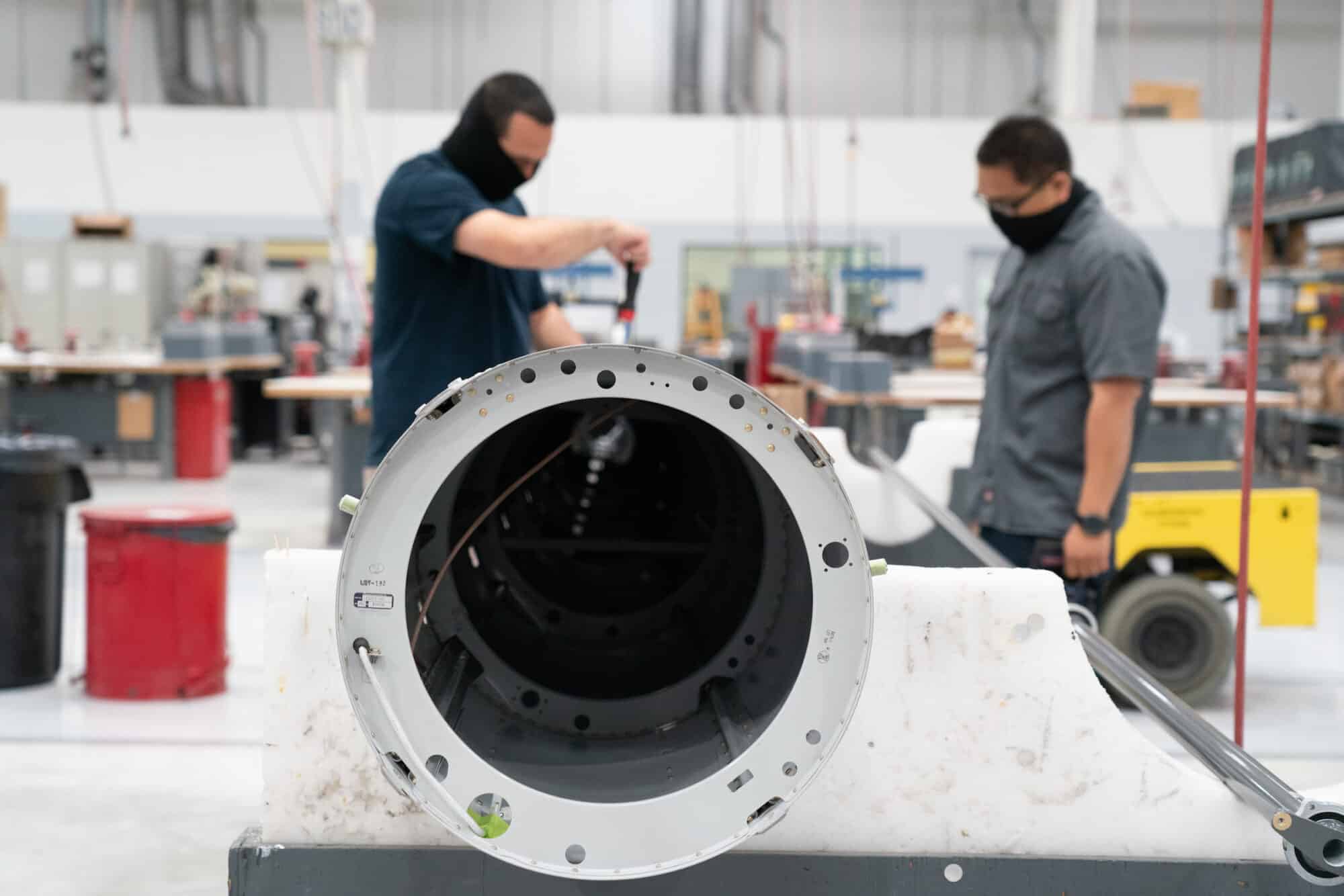
Attention to detail is a core value of Robinson’s workforce. Here, two of Robinson’s employees focus on the critical work they do to make sure Robinson’s helicopters can perform successfully and safely.
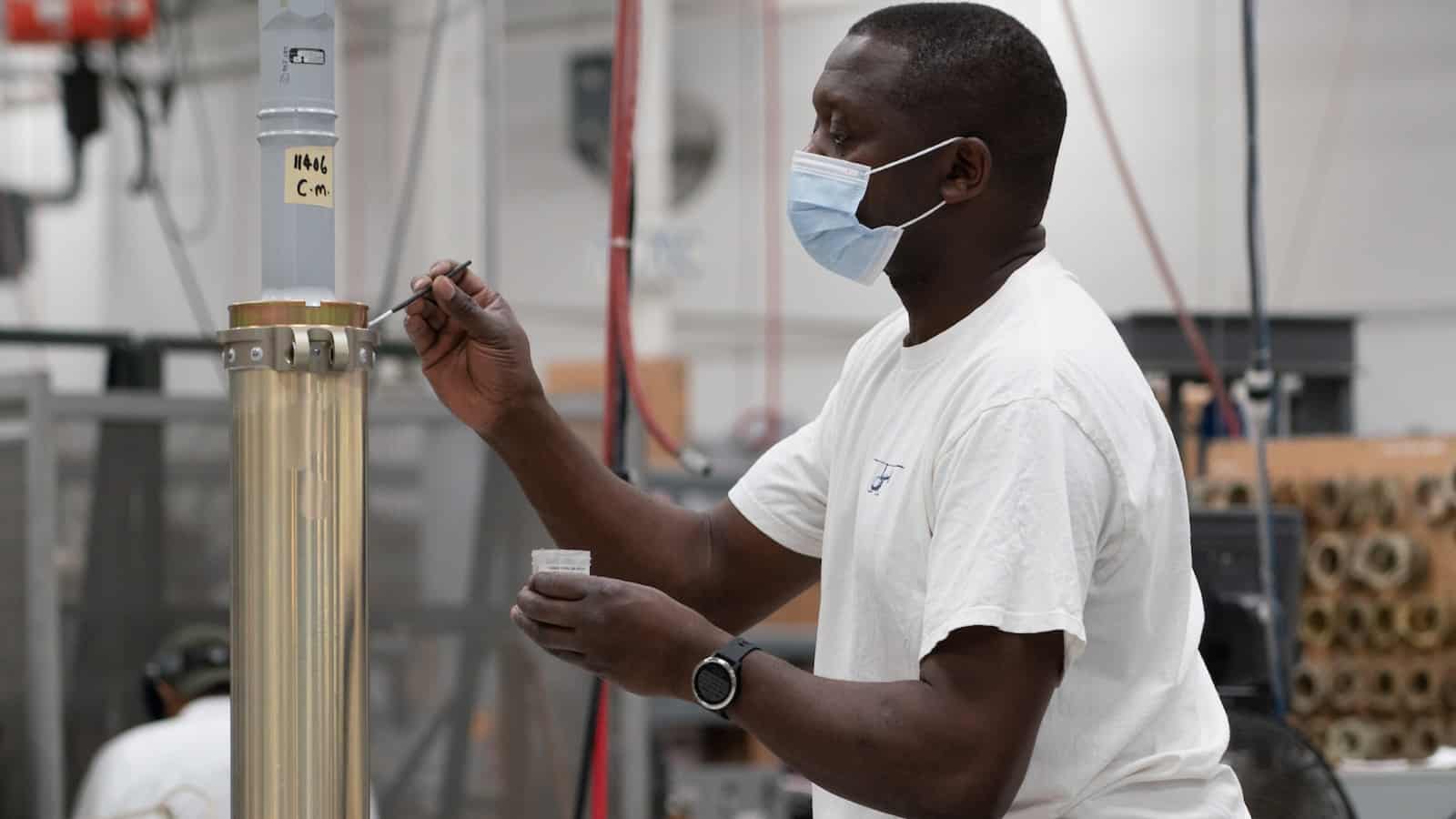
The people who use Robinson’s machines are precious cargo—and so employees are careful to make sure that every piece, no matter how small, is handled correctly.
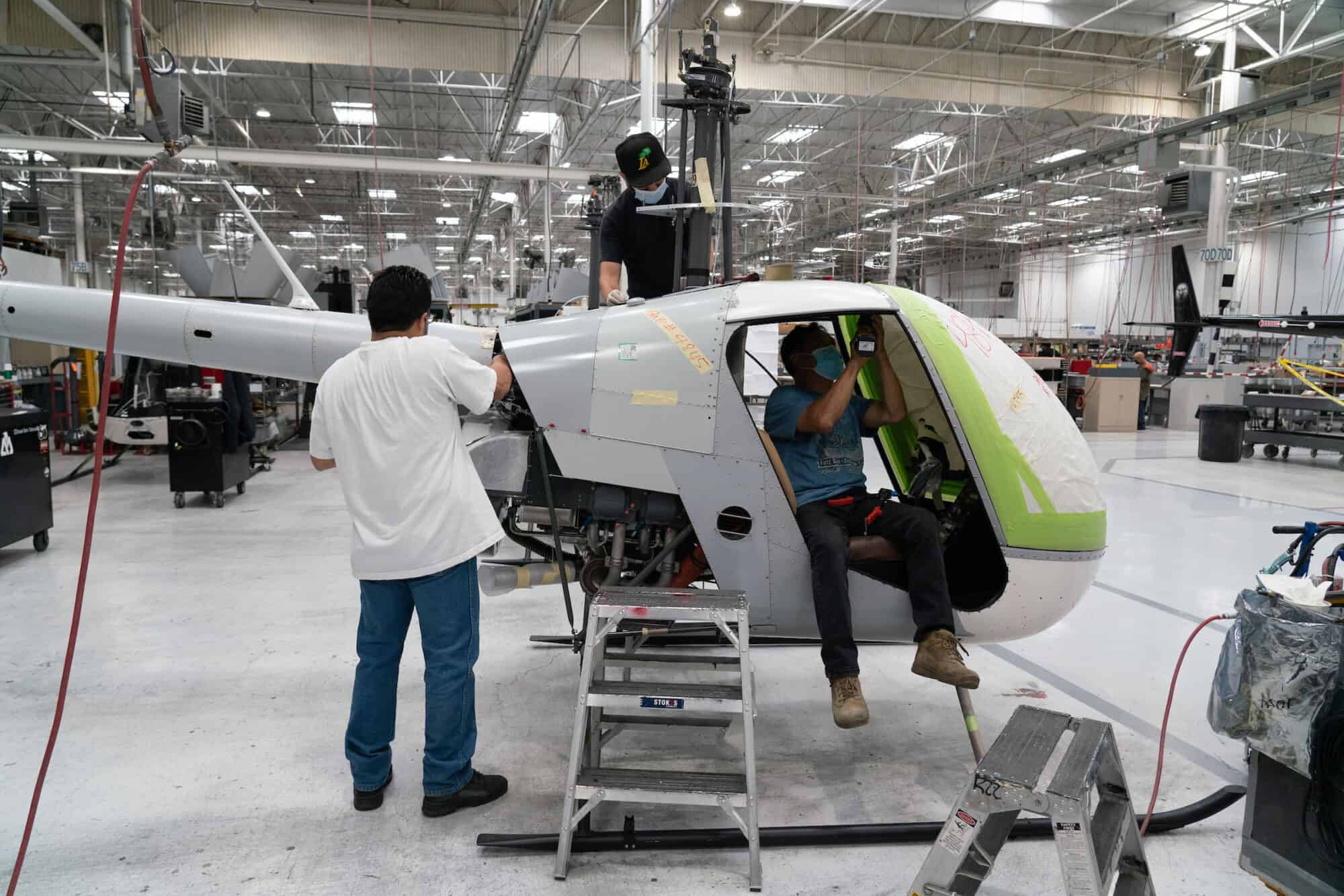
Robinson’s employees work hard on their machines—inside and out.
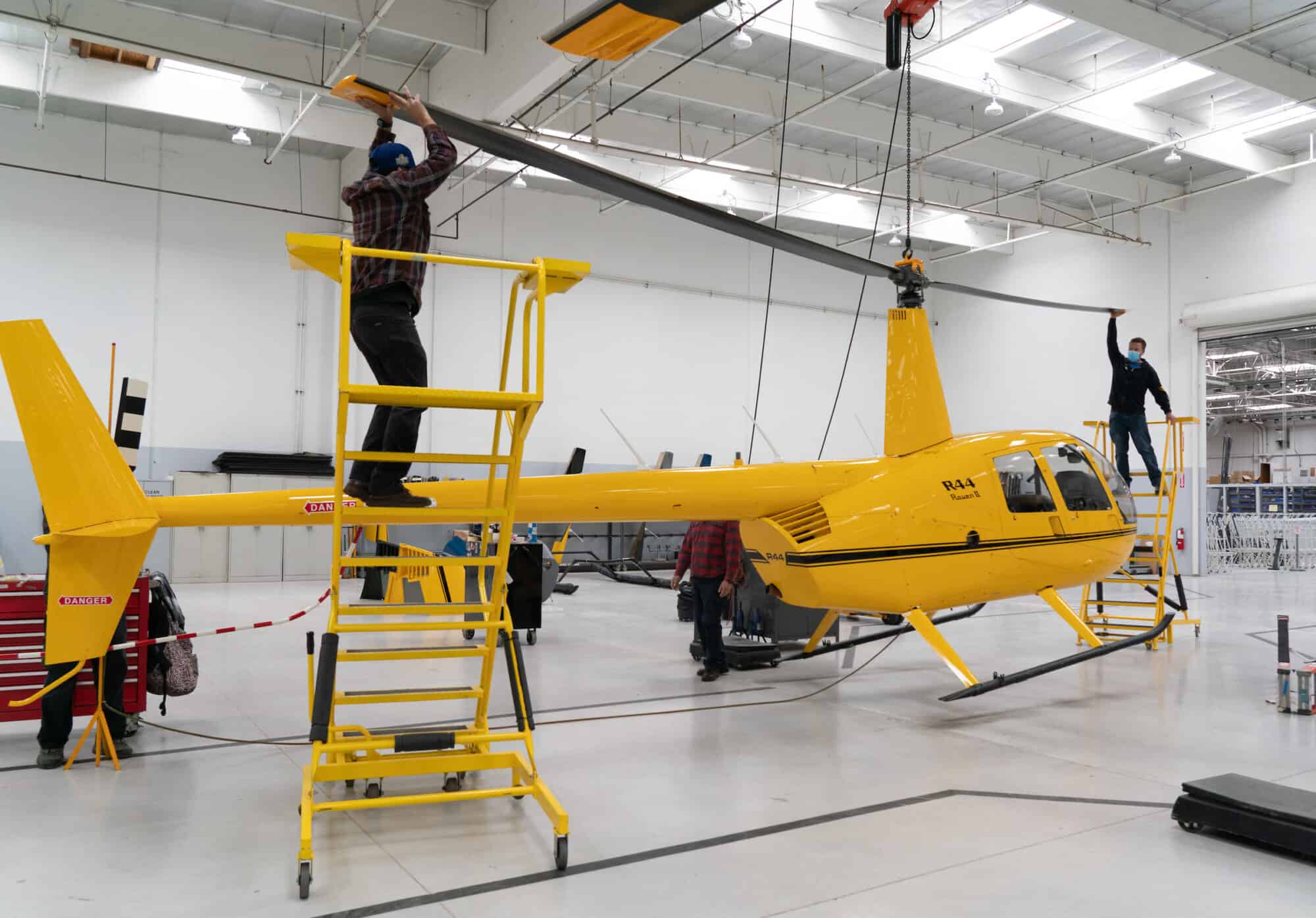
With a few finishing touches—like the rotor blades—this R44 Raven II will be ready for flight.
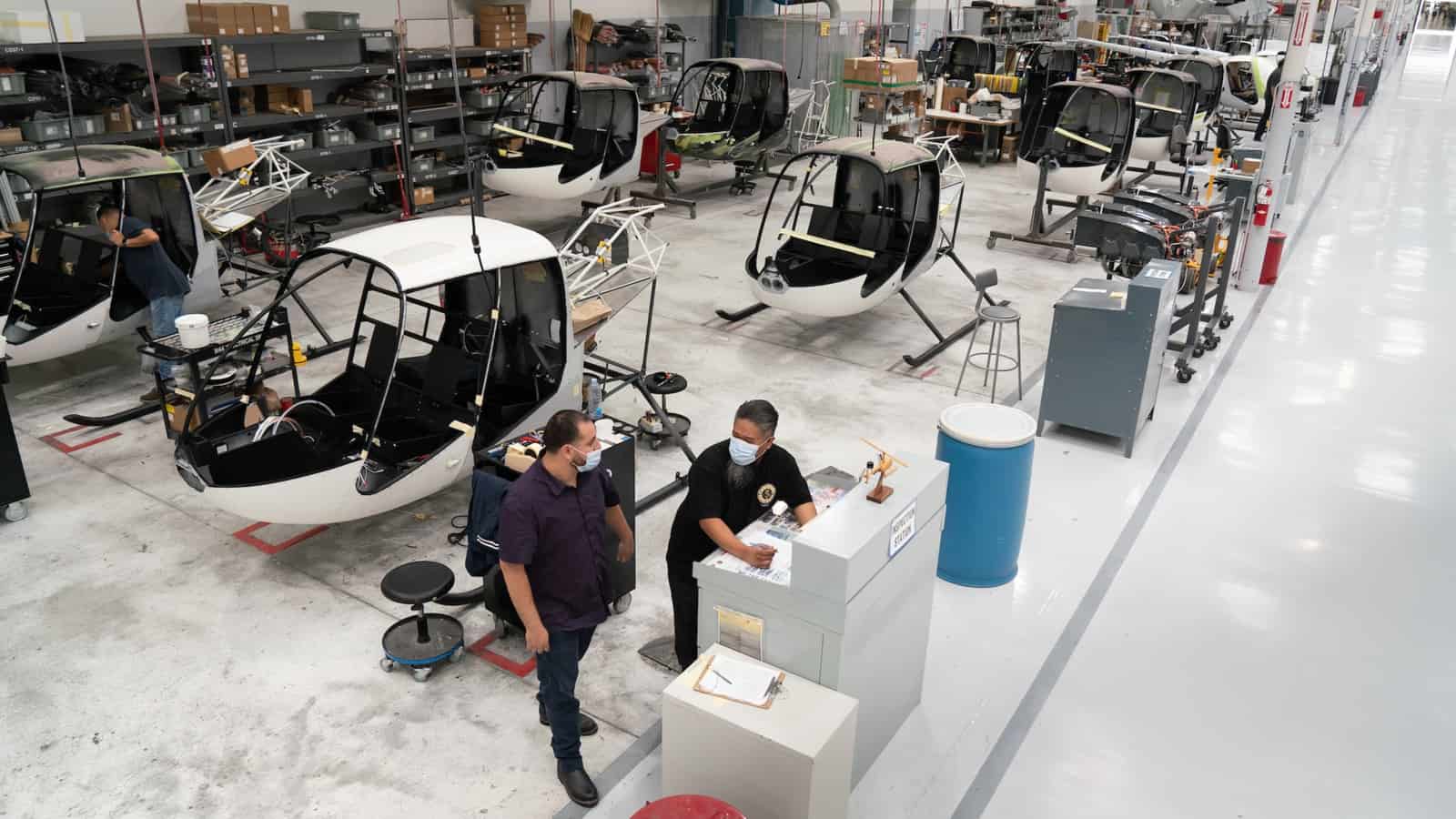
At Robinson, the work is never done. Here, a group of helicopters-in-progress wait to join the more than 13,000 helicopters that the company has already delivered worldwide.
The last word: “We are proud to be the world’s leading producer of civil helicopters and take great pride in our employees and their commitment to quality,” said Robinson President and Chairman Kurt Robinson.
ICYMI: NAM’s Jay Timmons Discusses Creators Wanted, COVID-19 Vaccines and Reconciliation on CNBC
Timmons on Labor Shortages, Creators Wanted Campaign
“Let’s be upfront about it. We have a very severe worker shortage in our country right now. It’s why the NAM has been so focused on our Creators Wanted campaign, to attract that next generation of manufacturing workers, and we are in competition now all across every sector for workers.
…
“So, if you think about supply chain shortages, why is that happening? Part of it certainly is the pandemic and the ability for trade to move freely, but you also have issues of not enough people at factories producing the component parts that go into finished products. What does that lead to? That leads to higher prices. So, it’s a supply and demand issue. Jim Cramer earlier today talked about a focus on getting this worker shortage under control. He mentioned, for instance, one possibility of helping to deal with this is immigration reform and that he thinks that there is a potential bipartisan solution to that. I believe there is as well. We have been pushing that through our program called A Way Forward at the NAM for a number of years. We think that’s one thing that will help get the economy back and deal with some of these issues.”
Timmons on Separating Infrastructure Investment from the Budget Resolution
“I think it was an extraordinary achievement by the Senate, a bipartisan achievement by Republicans and Democrats to get that bill across the line. We said at the NAM from the start that we would see probably about $1.2 trillion without punishing and archaic tax increases that would take us back to a time when we weren’t able to invest and hire and grow wages like we have for the last three years…We think that this bipartisan solution needs to get across the finish line. This is a very big priority not only for the president, but also for the American people. We know that can get done.
“…the reconciliation package that may be being developed…we have some serious concerns. We will certainly oppose any of the archaic tax increases that have been discussed. We are hearing somewhere between $1.8 and $3.5 trillion on job creators in America. That would take us to where we were before the 2017 tax reforms, where, afterwards, as I said, we were able to have record investment, record job creation, record wage growth. Why would we ever want to undo that? We are watching that very closely. We will oppose the bill with any of those factors in there. We will oppose the pharmaceutical issues that are in those bills that will stop us from being able to deal with the next pandemic. And we are going to oppose the labor provisions that would drive a wedge between management and our workers. There are a lot of things in that bill we don’t like. But infrastructure, BIF as it’s called in Washington speak, needs to get across the line right away. It’s an accomplishment we can all be proud of.”
Timmons on the NAM’s Vaccine Mandates
“I am so proud of the NAM team…We had a…94% vaccine acceptance rate before we imposed the mandate, and since then…we have achieved 100%. And I am thrilled because our team cares about not only themselves and their families, but also the people that we interact with every day—our 14,000 member manufacturers across the country. It’s the responsible thing to do, and I am happy that team NAM came through.
…
“What I hear from every single CEO that we represent is that their number-one concern is their employees, the health of their employees, the health of their employees’ families and their communities…It’s become political at times, but it doesn’t need to be. The last administration through Operation Warp Speed helped develop a vaccine in just record time with all the safety protocols in place. This administration is executing the vaccinations across the country. It’s a bipartisan effort, a nonpartisan effort, I would say, to make sure that our communities are safe, that our country is safe and the world can return to normal. It’s the only way it’s going to happen—we know that.”
-NAM-
The National Association of Manufacturers is the largest manufacturing association in the United States, representing small and large manufacturers in every industrial sector and in all 50 states. Manufacturing employs more than 12.4 million men and women, contributes $2.44 trillion to the U.S. economy annually, has the largest economic multiplier of any major sector and accounts for 58% of private-sector research and development. The NAM is the powerful voice of the manufacturing community and the leading advocate for a policy agenda that helps manufacturers compete in the global economy and create jobs across the United States. For more information about the NAM or to follow us on Twitter and Facebook, please visit www.nam.org.
How Manufacturers Are Dealing with Delta

As the COVID-19 pandemic keeps changing, plenty of manufacturers are looking for answers on how to protect their employees. To help clarify where we stand and what comes next, the NAM hosted a town hall on the strategies manufacturers are deploying to keep workplaces safe as well the vaccine policies some companies are implementing in response to the delta variant.
Who participated: Moderated by NAM Vice President of Infrastructure, Innovation and Human Resources Policy Robyn Boerstling, the webinar featured Dr. Michael Ybarra of the Pharmaceutical Manufacturing Association (PhRMA); NAM Senior Vice President, General Counsel & Corporate Secretary Linda Kelly; Senior Director of Global Compensation & Mobility R.J. Corning of Whirlpool Corporation; and Vice President and Chief Communications Officer Shannon Lapierre of Stanley Black & Decker.
The vaccination deal: Dr. Ybarra gave a rundown of the current state-of-play in the pandemic, detailing the various kinds of vaccines—protein-based, viral vector, and mRNA—and laying out which vaccines have been approved for use in the U.S. (Johnson & Johnson, Pfizer and Moderna). He explained the reasons why variants are occurring, and the possible need for booster shots as the effectiveness of vaccines wanes and variants create further challenges.
- Who’s at risk: “It’s still the unvaccinated,” said Dr. Ybarra. “It’s people who are young and think they’re invincible and don’t need the vaccine, and people who maybe just got one dose of the vaccine and didn’t complete their series. That’s the super high risk.”
- Masks on: “Even if you’re vaccinated, you should wear a mask indoors,” said Dr. Ybarra. “You don’t want to stress test the vaccine.”
- An important reminder: Ybarra noted a “humbling reality”: that almost all of the current COVID-19 deaths are among unvaccinated people.
“The best thing you can do right now is get the vaccine if you’re not vaccinated,” said Dr. Ybarra. “It’ll provide protection against the worst impacts of COVID-19. And if you’re in that high stress environment of being indoors with people whom you don’t know are vaccinated, it’s important to wear a mask because it will provide that extra layer of protection.”
An NAM policy rundown: Kelly provided an overview of the NAM’s policies and explained its phased approach to a vaccine mandate for all employees.
- A vaccine mandate: In July, the NAM made a decision to require all NAM employees to be vaccinated or to seek accommodations for medical or religious reasons by September 20.
- A NAM, a plan: “This decision was not taken lightly,” said Kelly. “We talked about it for a long time, we worked through a lot of issues, we sought outside legal advice on it. But we saw it as the next evolution on our ongoing workplace safety posture during the pandemic.”
- Good feedback: “As we have been rolling this out…we’ve actually heard from a number of employees who have thanked us, because the policy has made them feel safer about being in the office,” said Kelly.
- Useful advice: “No matter what you’re doing on your vaccine policies, you need to have your HR, your legal team, and your communications team working very closely together,” she added.
Cases in point: Corning and Lapierre discussed the actions they have taken at Whirlpool and Stanley Black & Decker to prioritize employee health and safety.
- Masking up: Both Whirlpool and Stanley Black & Decker have responded to the increase in cases by re-imposing mask mandates.
- Incentivizing vaccines: While vaccines are not yet mandatory for employees, Whirlpool is focused on making it easy for people to be vaccinated—in particular by holding large onsite vaccination clinics where possible. It is also providing $250 to people who get vaccinated. Stanley Black & Decker has sent its chief medical officer and local doctors to facilities where vaccine uptake is low to answer questions and provide encouragement. The company has also set up on-site vaccine clinics where possible.
- Collecting data: Whirlpool is working to collect data from its employees to better understand who is getting vaccinated, and to gather information on any breakthrough infections. Stanley Black & Decker, meanwhile, surveyed its employees early on in order to gauge interest in vaccinations so it could target its efforts appropriately. Both are taking care to protect their workers’ confidentiality.
The last word: “We’re not going to have all the answers, but we can help guide people in the right direction and help them make the best choices for their circumstances,” said Boerstling.
FAME Program Grows Despite the Pandemic
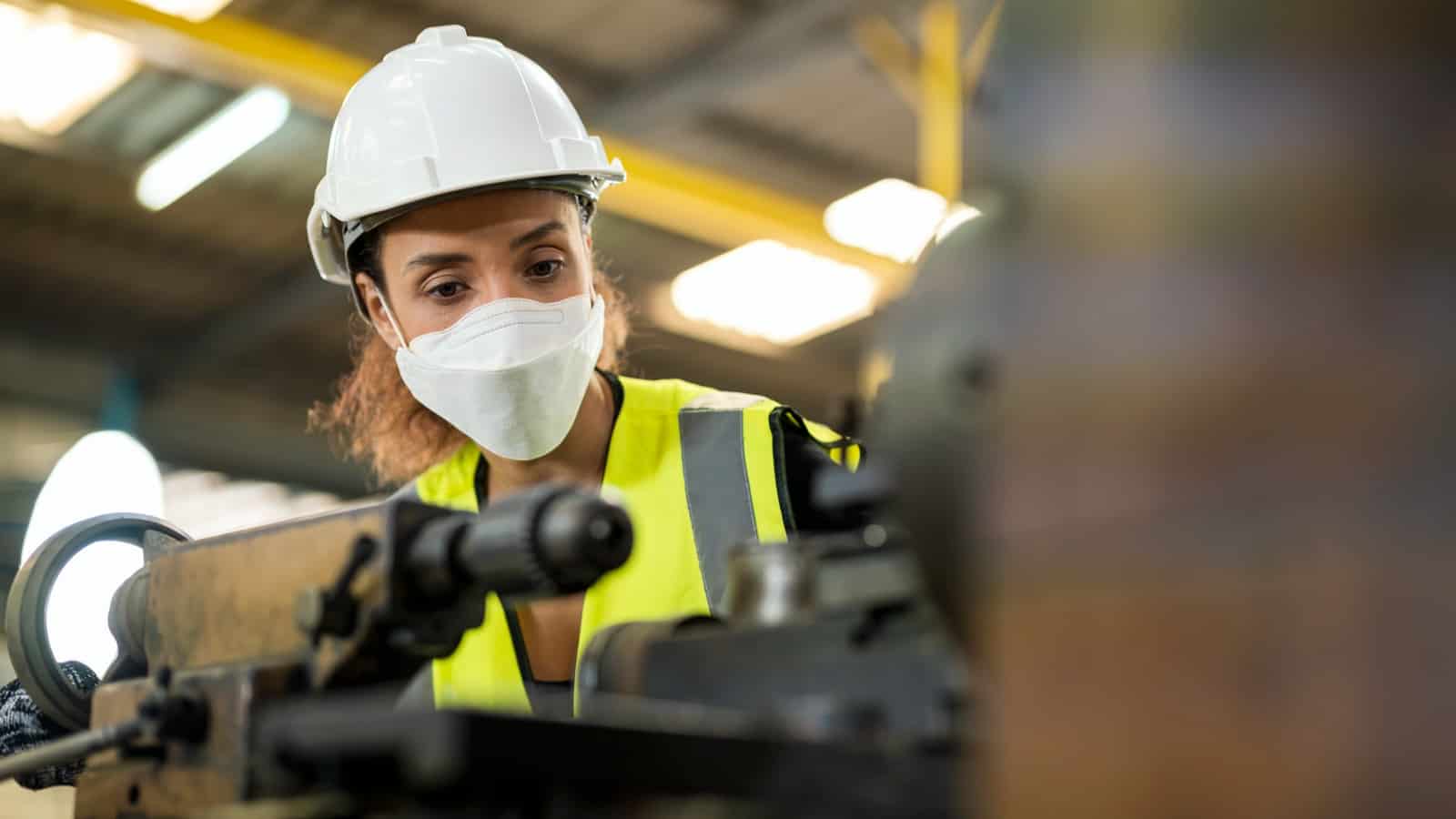
The past 18 months have been trying for students of all ages, as they have navigated virtual learning in place of or in combination with in-person classes. But for many of those enrolled in the Federation for Advanced Manufacturing Education (FAME) program, 2020 and 2021 have presented a unique educational and professional opportunity.
The background: Founded by Toyota and now operated by The Manufacturing Institute, FAME is the top U.S. program for training students who seek careers in manufacturing. Enrollees who complete it earn associate degrees and certification as advanced manufacturing technicians (AMTs), while working part time in manufacturing facilities—and being paid competitively.
- “After two years of increasing experience, consistent organizational and cultural acclimation, as well as professional growth—coupled with the company’s investment made in wages—most graduating AMTs (about 85%) go to work for the sponsoring employer upon graduation,” MI Workforce Initiatives Senior Director Tony Davis told us.
The first pandemic opening: Despite the global outbreak of COVID-19 less than six months prior, FAME saw the opening of a new chapter in fall 2020: FAME on the Plains, based in Opelika, Alabama.
- “It was a challenge, to say the least,” says Davis. “But they recruited about nine students.” Three will graduate in May 2022, having overcome some unprecedented challenges.
- In fact, the chapter remained undaunted and, thanks to the appeal of the earn-and-learn FAME model, is heading into fall 2021 with 25 AMT students.
Nine more chapters, coming soon: That one chapter was only the beginning. Thanks to its successful virtual recruitment efforts and other outreach, FAME will open nine new chapters in 2021. This explosive growth—nearly 40% since last year—brings the number of national FAME chapters to 32 across 12 states. Here are the new chapters by state:
- Colorado: Colorado will get its first FAME chapter, CO FAME of Pueblo.
- Florida: Florida, also a first timer, will get not one but two new chapters: the FL FAME – Gulf Coast Chapter of Bay County/Panama City and the FL FAME – Sunshine Chapter of Volusia County/Daytona Beach.
- Indiana: Indiana will acquire chapters two, three and four in the state: the Central, Hoosier and NEI chapters, which are located respectively in Indianapolis, Anderson and Fort Wayne. These chapters join the IN FAME – So.INFAME Chapter of Vincennes.
- Michigan: Michigan will also get a new entry on the FAME map, thanks to the MI FAME – JAMA Chapter of Jackson.
- Texas: Texas will get its second location, the TX FAME – Dallas Chapter of Garland.
- Virginia: And last, Virginia is also starting its first chapter, the VA FAME – Central Virginia Chapter of Prince George County/Petersburg.
The last word: “We are proud to welcome so many new locations into the FAME network,” said MI Vice President of Strategic Initiatives Gardner Carrick. “It is a testament to the seriousness of the workforce shortage and the success of the FAME model that companies have been willing to invest in this solution during this challenging year. We’re excited to support these new companies and look forward to welcoming hundreds of new FAME students this fall.”
